Since the beginning of the Covid-19 pandemic, there has been a substantial tumult followed by a sharp turnaround in the oil and gas industry, or at least in the prices of the underlying commodities that dictate its development.
The year 2020 will go down in history as a rather eventful one for oil. By the end of Q3 2021, oil prices stood at more than $70 per barrel for WTI and $80 per barrel for Brent. However, prices were incredibly volatile during the pandemic and in April 2020, when Covid-19 reached the western world and stay-at-home orders were imposed, pressures on both the demand and supply side caused the oil price to go down to lower than $20 per barrel, down from $50-$60 in the preceding months.
WTI futures even entered negative territory in April, which made for memorable headlines, though the latter was admittedly due to a technicality related to the physical delivery settlement of such contracts. Since then, oil prices have moved considerably up and appear likely to sustain their upward momentum in the short run, given the overall supply situation.
More recently, there has also been mounting pressure on the price of natural gas, particularly with respect to Europe. The region relies heavily on natural gas not merely for heating, but also for its electricity generation. Many coal power plants have been scraped and replaced with alternative renewable sources. However, this process would have been unthinkable without using natural gas to supplement renewables when necessary.
Europe’s predicament
The predicament comes from the fact that Europe has very little natural gas deposits of its own and relies heavily on imports. To make matters worse, within the context of the global gas supply chain, most competitive gas exports are first routed toward other regions, such as China, for instance, leaving Europe to buy whatever is left. Also, a large proportion of the natural gas supplies for the continent come from Russia, which has led to some geopolitical tensions in the past.
Rising natural gas prices are already reflected in surging electricity bills for households across Europe and this makes the situation all the more tense for political decision makers, as rising electricity and oil prices are likely to translate into sustained higher inflation rates. Some commentators have sardonically borrowed the term “greenflation” to describe this. The term was coined by billionaire and philanthropist Bill Gates in his latest book How to avoid a climate disaster, to describe a premium that will have to be paid on environmentally friendly goods and services.
Active market
Despite recent turmoil, oil and gas majors, along with their peers, have remained active in corporate venturing, irrespective of the headwinds or tailwinds. During the latter half of the past decade, there has been a shift of focus among oil and gas corporates, still very much evident today and likely to continue to hold in the post-pandemic world. Namely, many of the disclosed deals by corporate venturers tend to go into emerging businesses from non-core areas, primarily in IT and cleantech, as well as transport and mobility.
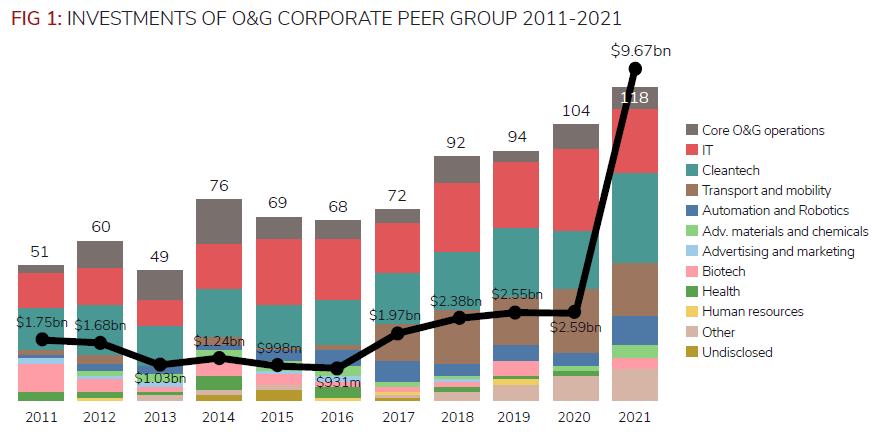
Such non-core areas have been considered precisely with most disruptive potential to the core business of oil and gas, as low-carbon energy technologies may replace or considerably eat up the position of fossil fuels in the future. The increasing adoption of electric vehicles may affect a considerable part of the customer base of oil and gas companies. There has also been an increasing digitisation of industrial activities, which exerts a tangible impact over production and efficiency.
However, it would not be unreasonable to expect more investments in core oil and gas technologies, particularly in companies whose solutions provide significant cost-savings or make operation less polluting. Such investments will continue to form part of the portfolios of corporate venturers from the sector due to its capital-intensive nature, contingent on the up and down swings of commodity prices. Thus, any innovation improving processes and reducing fixed costs would be likely embraced.
Over the long haul, corporate venturing arms of oil and gas incumbents will most likely continue to be more strategic rather than purely financial in terms of their orientation. In addition to investing in technologies that may profoundly disrupt the sector, strategic benefits may come in the form of building an ecosystem, finding suppliers, or helping business units with specific technical challenges.
Attention grabbers
During Q3 2021, cleantech, transport and IT startups received more attention than other areas. The average size of deals for 2021, in which oil and gas corporate venturing peers participated stood at $51.72m, moving significantly upwards with respect to figures in previous years. In total, we tracked a record 118 deals by the peer group conducted during the first nine months of this year, which were worth an estimated $9.67bn – figures surpassing the totals from any previous year. This surge of investment activity and total estimated dollars indicates a surge in valuations – a phenomenon seen almost universally across different domains of innovation and venture capital at the moment.
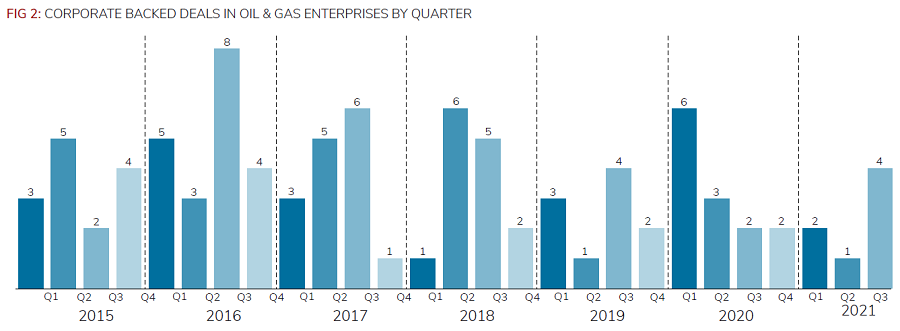
UK-based BP has participated in a significant number of rounds raised by transport and cleantech companies since 2014, along with investments in core operation technologies and biotech. France-based Total has placed bets on cleantech and transport, while Anglo-Dutch company Shell has been focused on both cleantech and core oil and gas technologies, as well as IT. US-based Chevron’s disclosed deals have historically revolved around core energy operations, the digital dimension of its operation and, most recently, in cleantech. Saudi Arabia-based Saudi Aramco has focused its minority stake investments on IT, core technologies, and, increasingly, cleantech. Nearly all oil and gas majors have been involved with the low carbon and advanced mobility opportunities on the venturing scene.
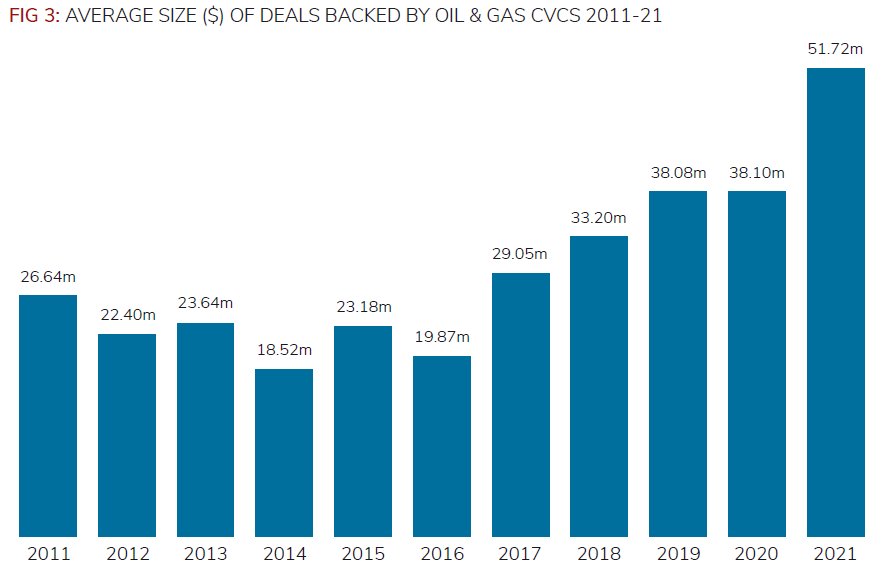
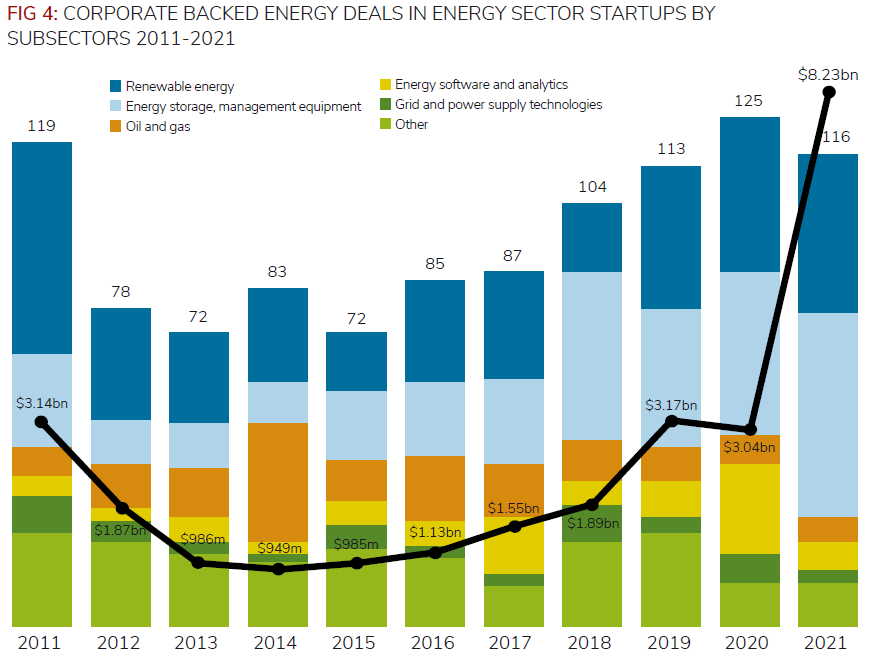
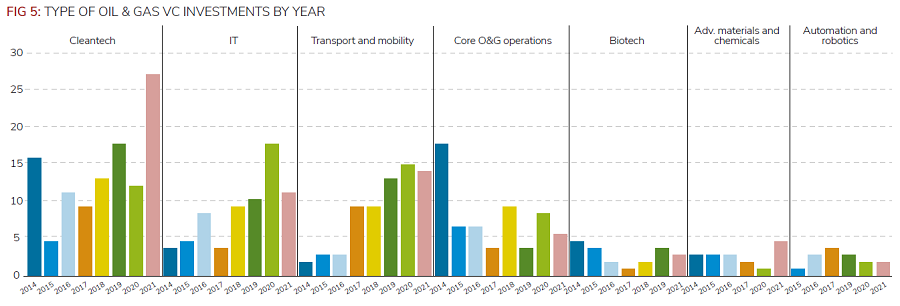
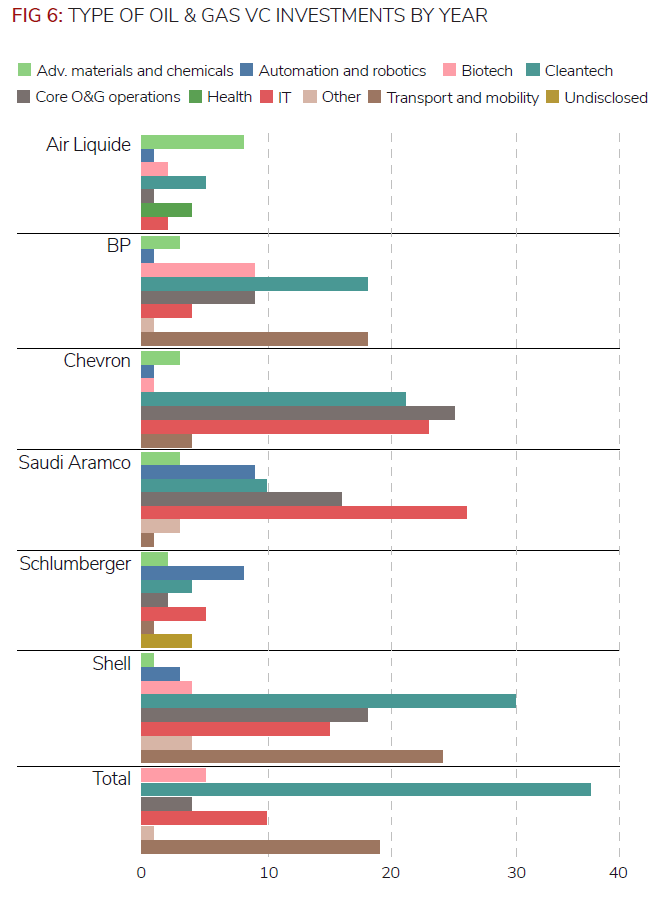
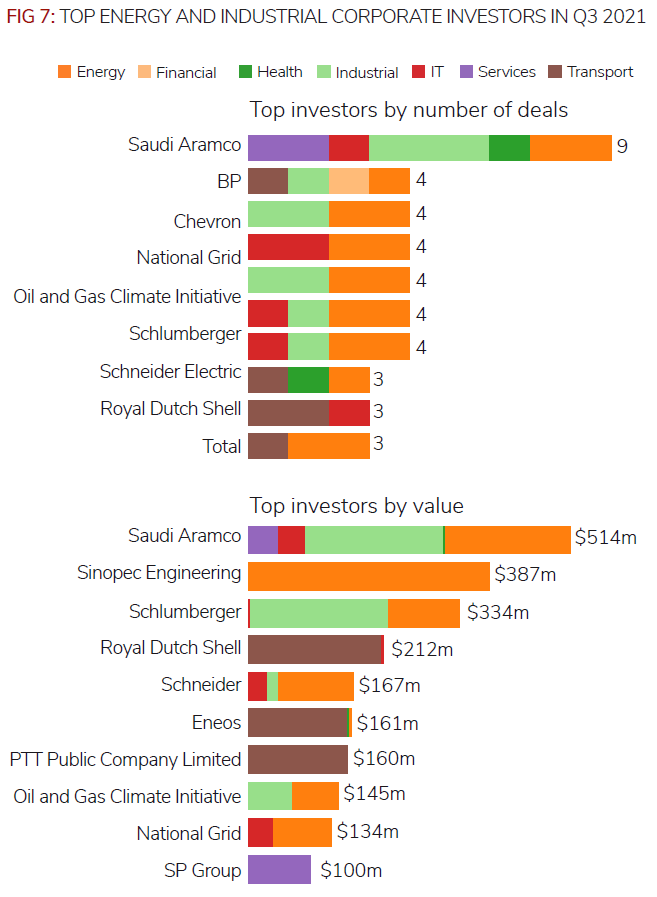
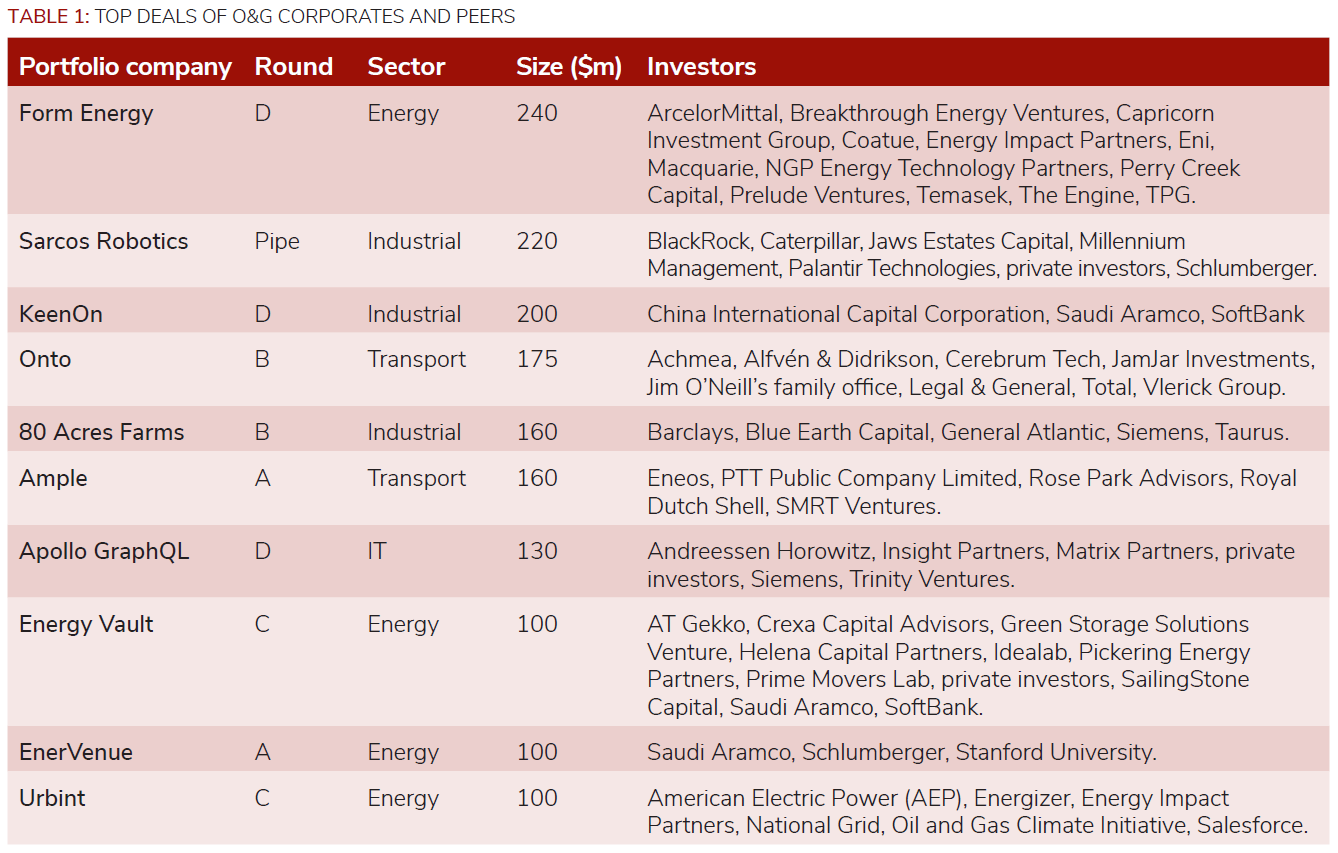
Sector specialist: Aruna Subramanian, managing director and board member, Sabic Ventures
Aruna Subramanian serves as managing director and board member for Sabic Ventures, the Netherlands-based corporate venture capital (CVC) unit of Saudi Arabia-headquartered petrochemical producer Saudi Basic Industries Corporation (Sabic).

“Corporate venturing has the potential to make larger-scale sustainability impact happen through investments that are not driven only by shorter-term financial returns but also longer-term strategic returns,” Subramanian said. “CVCs have a unique role to play in the investment space to complement the conventional VC funds.”
Formed in 2011, Sabic Ventures targets developers of technologies relevant to the corporate’s strategic priorities, including advanced materials and composites, alternative feedstocks for chemicals and materials, and clean technology.
“We have made some very interesting investments in companies such as Qpinch, Imtex, Void Technologies and New Leaf which are all enablers of our sustainability focus. We also actively support Sabic’s Trucircle initiative.”
Subramanian joined Sabic Ventures in 2015 as a senior portfolio manager, having come from over two decades of professional experience in the oil and gas, petrochemical and venture capital industries globally.
Deals
The oil and gas companies found among top corporate venture investors from the industrial and energy sectors were oil and gas companies Saudi Aramco, BP, Chevron, Schlumberger, Eneos, Shell and Total. During the third quarter of 2021, we reported a number of interesting and sizeable deals involving oil and gas corporate venturers and their peers. In fact, all of the top 10 deals done by this group of investors were $100m or more in size.

Form Energy, a US-headquartered developer of grid-scale energy storage systems, completed a $240m series D round led by steel producer ArcelorMittal’s XCarb fund. XCarb provided $25m for the round’s first close, and the round also featured energy utility Eni’s Next fund. Perry Creek Capital, NGP Energy Technology Partners, Coatue, Temasek, Energy Impact Partners, Breakthrough Energy Ventures (BEV), Prelude Ventures, The Engine, Capricorn Investment Group and Macquarie Capital filled out the investors with TPG Rise Climate and The Rise Fund. Formerly known as Baseload Renewables, Form Energy has created a system built around a rechargeable iron-air battery capable of providing electricity for some 100 hours at a fraction of the cost of lithium-ion batteries. The technology is used to store surplus energy from renewable power plants, allowing them to supply energy across multiple days even in less beneficial conditions. The company plans to jointly develop ion materials with ArcelorMittal for use in its systems.
US-based robotics developer Sarcos Robotics raised a $220m post-IPO equity round, which featured oil services provider Schlumberger, Caterpillar Ventures – the venturing unit of construction equipment manufacturer Caterpillar and data analytics provider Palantir Technologies. The round was filled out by institutionals Blackrock, Millennium Management and Jaws Estates Capital as well as by private investors. Sarcos was founded in 1983 and acquired by defence and industrial technology supplier Raytheon in 2007 before its CEO led a buyout in 2015. Sarcos produces dexterous robots capable of traversing difficult spaces, which can be used to lift heavy items, or in surveillance and inspection. The company has also created a robotic exoskeleton that helps protect and increase the strength of workers doing difficult and potentially arduous jobs.
China-based service robot manufacturer Keenon Robotics received $200m in a series D round led by telecommunications and internet group SoftBank’s Vision Fund 2. The round included Prosperity7 Ventures, the growth equity fund owned by Saudi Aramco’s corporate venturing arm, Aramco Ventures, as well as China International Capital Corporation’s CICC Alpha subsidiary. Founded in 2010, Keenon has developed service robots that use automation technology to carry out repetitive tasks in the service industries like catering, hospitality, healthcare, entertainment and real estate. It is currently active in China, Europe, the US, South Korea and Singapore.
UK-based electric vehicle (EV) subscription service Onto secured $175m in a series B equity and debt round that included Legal & General, Achmea and TotalEnergies. Venture capital firm Alfvén & Didrikson led the equity portion of the round, which also featured Cerebrum Tech, JamJar Investments, family-owned holding Vlerick Group and Jim O’Neill’s family office, while Pollen Street Capital supplied a senior-secured asset backed debt facility. Insurance and financial services firm Legal & General invested through VC platform Accelerated Digital Ventures (ADV), while healthcare insurer Achmea and oil and gas supplier TotalEnergies deployed capital through Achmea Innovation Fund and TotalEnergies Ventures respectively. Onto provides an electric car subscription model which includes 1,000 miles per month, insurance, servicing and repair as well as free access to more than 11,000 public EV charge points. It has partnerships with Shell Recharge, BP Pulse, InstaVolt and Tesla Supercharger. The funding will further accelerate the expansion of Onto’s subscription business across the UK while supporting plans to export its model to other markets in the future.
US-based EV battery technology developer Ample raised a series C funding round sized at $160m, which was led by Moore Strategic Ventures and also featured returning corporate investors Shell Ventures and petroleum supplier Eneos. Thailand-based state-owned gas and oil company PTT also participated in the round, alongside Momentum Venture Capital (formerly SMRT Ventures) and Rose Park Advisors, the latter through its Disruptive Innovation Fund. The fresh funds will be used to scale its modular battery swapping technology across the US and around the globe. Founded in 2014, Ample has developed a faster, lower-cost modular battery swap network. In addition to its collaboration with ride hailing services provider Uber, Ample also announced a collaboration with Eneos to bring its technology to Japan, as well as a partnership with NYC-based fleet provider Sally to create a reimagined battery swapping experience for EV drivers and bring more EV taxi and ride-sharing drivers on the road.
Next47, a corporate venturing subsidiary of industrial equipment and appliance provider Siemens, participated in a $130m series D round for US-based software developer Apollo GraphQL. Insight Partners led the round, which also included Andreessen Horowitz, Matrix Partners, Trinity Ventures and private investor Hatim Shafique. The business was reportedly valued at over $1.5bn through the round. Apollo is focused on building GraphQL technology used by software engineers to develop unified graphs to speed up and improve software development. GraphQL is a data query language for application programming interfaces that was developed by internet company Facebook in 2012 before it was made open source in 2015.
US-based battery manufacturer EnerVenue secured $100m in a series A round featuring Schlumberger and Saudi Aramco. Schlumberger led the round through its New Energy division, while Saudi Aramco invested through Saudi Aramco Energy Ventures. Stanford University also reportedly took part in the round. EnerVenue is developing nickel-hydrogen batteries for use in grid-scale energy storage systems, a market set for significant growth as renewable energy – which tends to be intermittent in its generation throughout the day – will require increasing amounts of storage assets. Nickel-hydrogen batteries, which are typically used in aerospace contexts, have certain advantages over the lithium-ion models that many energy storage assets use, including a higher resilience and longevity. The funding will be used to build a gigafactory in the US to manufacture the company’s batteries, as well as boost research and development efforts and expand its sales and distribution capabilities.
US-based infrastructure protection software developer Urbint hauled in $60m through a series C round featuring enterprise software provider Salesforce and energy utilities American Electric Power and National Grid. Venture capital firm Energize Ventures led the round, which also included OGCI Climate Investments and Energy Impact Partners, while Salesforce and National Grid participated through Salesforce Ventures and National Grid Partners respectively. Urbint provides artificial intelligence software designed to predict risks and prevent threats to critical infrastructure. The infrastructure legislation making its way through the US Congress – a $1 trillion bipartisan bill and an approximately $3.5 trillion package being proposed through a parallel track – are set to put the kind of software Urbint provides in higher demand, as resiliency of infrastructure comes to the forefront.
Hydrogenious LOHC Technologies, a Germany-based hydrogen carrier technology developer, raised €50m ($59m) in a funding round led by Jera Americas, a subsidiary of energy utility Jera. The corporate provided $17.7m and was joined by Chevron Technology Ventures, the investment arm of Chevron, fuel tank producer Royal Vopak, metal forming technology producer Winkelmann Group and mining group Anglo American Platinum (AAP)-backed AP Ventures. The round also included Temasek, Pavilion Capital. Automotive manufacturer Hyundai had injected an undisclosed amount in May 2020 following a similarly undisclosed sum from AAP in 2014 and $18.9m from Royal Vopak, AP Ventures, conglomerate Mitsubishi, polymer and chemicals manufacturer Covestro and in 2019. Founded in 2013, Hydrogenious LOHC has devised a storage technology that enables liquid hydrogen to be safely stored and transported through conventional fuel delivery channels, for purposes such as refuelling and industrial distribution. Whereas incumbent products utilise either liquefied or compressed hydrogen, Hydrogenious LOHC claims its approach stores hydrogen at ambient temperatures with a reduced risk of toxicity, combustibility or explosion. Hydrogenious is a spinout of Friedrich-Alexander-University Erlangen-Nürnberg.
India-based bike taxi service provider Rapido secured $52m in a series C round backed by Shell, automotive manufacturer Yamaha and human resources consulting firm Positive Moves Consulting. The round also featured investment firm Westbridge Capital, venture capital firm Nexus Venture Partners, family office Everblue Management, as well as individual investors Kunal Shah, Amarjit Singh Batra and Pawan Munjal. Shell was represented in the round by Shell Ventures. Founded in 2015, Rapido operates a mobile app for booking bike taxi services across approximately 100 cities in India. The company will use the funding to hire new staff, complete strategic investments and broaden its technology stack.
GHGSat, a Canada-based developer of greenhouse emissions tracking technology, secured $30m from investors including Schlumberger for the first close of its series B round. The state-owned Investissement Québec led the first close of the round, which also featured OGCI Climate Investments, Business Development Bank of Canada, Space Angels and Fonds de solidarité des travailleurs du Québec. Founded in 2011, GHGSat operates a greenhouse gas monitoring system that uses its own satellites to track emissions from space. It said the first close of the series B round increased its total funding to $55m. The company will channel the funding into construction of three high-resolution satellites in addition to tailoring its sensors for use in aircraft and opening an intelligence centre in the UK, as it upgrades its analytics capabilities in its home country.
Netherlands-based distributed electricity provider Zola Electric raised $90m in an equity and debt round led by TotalEnergies Ventures. The $45m equity portion was filled out by DBL Partners, Helios Investment Partners, Vulcan Capital, Electron Capital Partners and Lyndon and Peter Rive, co-founders of solar power system installer SolarCity. Netherlands-based development bank FMO and Sunfunder provided the debt portion. The round brings the company’s total debt and equity financing to $273m. Zola provides decentralised and off-grid electricity systems for communities in emerging markets with unreliable access to power. Its Infinity power system integrates with solar panels, batteries or the grid itself and manages power loads throughout the premises. The company’s systems supply energy to more than 1.5 million users across 300,000 households and businesses across Ivory Coast, Namibia, Ghana, Democratic Republic of the Congo, South Africa, Nigeria and Zambia.
US-based cybersecurity simulation software supplier AttackIQ raised $44m in a series C round featuring Saudi Aramco, Salesforce and telecommunications firm Telstra, through Saudi Aramco Energy Ventures, Salesforce Ventures and Telstra Ventures respectively. The round was led by Atlantic Bridge and included Gaingels, Index Ventures and Khosla Ventures, and the company said its total funding now stands at $79m. Founded in 2013, AttackIQ provides security validation software that helps users test and assess the effectiveness of security producers, controls and staff, providing cost effective ways of preventing or detecting attacker behaviours.
US-based autonomous cargo drone developer Elroy Air pocketed $40m in a series A round featuring aerospace and defence company Lockheed Martin’s corporate venturing arm, Lockheed Martin Ventures. Marlinspike Capital and Prosperity7 co-led the round, while Catapult Ventures, DiamondStream Partners, Side X Side Management, Shield Capital Partners and Precursor Ventures also took part. Elroy Air previously raised $6.8m in series A financing in April 2020, according to a securities filing, and its shareholders include TotalEnergies, and E14 Fund, a vehicle for Massachusetts Institute of Technology’s Media Lab. Founded in 2016, Elroy Air develops drones and specialises in the fields of logistics, robotics and air transportation.
US-based feed producer Calysta raised $39m in a series D-1 round led by returning investor BP’s corporate venturing unit, BP Ventures. Animal feed producer Adisseo also took part in the round, as did AquaSpark, WTI and unnamed existing investors. Founded in 2011, Calysta produces animal feed for pets, livestock and fish from fermenting natural gas, a process which requires no arable land, little water and does not compete with the human food chain. The funding will be used to scale the company’s FeedKind protein line, financing the scoping and pre-development of a new manufacturing site. The company aims to build out a production capacity of 20,000 tonnes per year by 2022 through an existing 50-50 joint venture with Adisseo called Calysseo.
Internet technology provider Google joined energy utilities Exelon and Avista and oil and gas producers Equinor and TotalEnergies in a $35m series C round for US-based energy transition software provider LevelTen Energy. The round was led by Energy Technology Partners, an affiliate of private equity firm NGP, and included My Climate Journey Collective, Founders’ Co-op, Prelude Ventures, Techstars, Wireframe Ventures and all the company’s existing investors. Equinor, TotalEnergies, Exelon and Avista participated in the series C financing through subsidiaries Equinor Ventures, TotalEnergies Ventures, Constellation Technology Ventures and Avista Development respectively. Founded in 2016, LevelTen has built an online platform that connects renewable energy buyers, sellers and advisers, and its LevelTen Energy Marketplace platform allows users to access more than 4,000 power purchase agreement (PPA) price offers. The capital injection will enable the company to scale its technology platforms and introduce new software products.
US-based methane-emission monitor developer Kairos Aerospace has collected $26m in series C1 financing led by DCVC, with commitments from mechanical component manufacturer John Crane, OGCI Climate Investments and Energy Innovation Capital. The latter three had backed a $9m series C round in April 2020, adding to $4.1m in earlier equity funding, according to regulatory filings. Founded in 2014, Kairos Aerospace Kairos had developed a methane-emission monitor solution which combines patented instruments and proprietary data analysis pipeline to provide customers with rapid, clear, actionable information about their methane emissions. Its aerial leak detection allows to monitor entire fields for a complete picture of emissions and easily captures emissions data from equipment that is wide-spread or difficult to access by ground. Kairos has surveyed more than 40,000 miles of pipelines and over 100,000 wells since 2016.
US-based cloud-based energy analytics software provider Bidgely closed a $26m funding round backed by Exelon’s Constellation Technology Ventures. Moore Strategic Ventures led the round and was also joined by Accurant International, Future Energy Ventures and Georgian Partners. IvyCap Ventures injected Rs150m ($2m) in March 2021, following an $8m commitment from CIBC Innovation Banking, the investment arm of financial services firm Canadian Imperial Bank of Commerce, in September 2020. Bidgely has built an artificial intelligence-equipped web and mobile analytics platform that works with energy suppliers to provide users with details on their activity that can be used to save energy. It also enables them to compare their energy use with those of other homes.
BP Ventures put up $13m to lead a $25m series A round for India-based ride hailing and electric vehicle charging service BluSmart. Mayfield India Fund, 9Unicorns and Survam Partners also took part in the round along with unnamed investors. The round followed $7m in pre-series A funding from Inflection Point Ventures, Venture Catalysts, Survam Partners, Mumbai Angels, Chhatisgarh Investments, Jito Angels, Lets Venture Fund and Kaplavriksh Fund in September 2020. Founded in 2019, BluSmart provides a zero-emission ride hailing service and also develops a fast-charging network for electric vehicles.
Aforza, the UK-based creator of a sales enhancement software product for the consumer goods industry, raised $22m in series A funding from investors including Siemens’ Next47 unit. Venture capital firm DN Capital led the round, which also featured Bonfire Ventures and Daher Capital, both of which had joined Salesforce Ventures in a seed round of undisclosed size for Aforza in 2019. Founded in 2019, Aforza has developed a suite of cloud and mobile apps that connect trade planning and field sales teams together to solve problems of unprofitable promotions, declining market share and lack of revenue growth.
US-headquartered hydro power turbine developer Natel Energy has secured $20m from investors including Chevron Technology Ventures. The round was led by investment fund Breakthrough Energy Ventures, which also took part in an $11m series A round for Natel in March 2020 led by SE Ventures, the investment vehicle for power and automation technology producer Schneider Electric then known as Schneider Electric Ventures, bringing its overall funding to approximately $46m. Natel has developed a turbine that can be integrated into hydro power installations to minimise environmental impact and help ensure fish can still travel downstream. It has been piloted at a system in the state of Maine and the cash will fund extra work on the technology.
Saudi Arabia-based farming technology developer Red Sea Farms secured $16m in pre-series A funding from investors including Saudi Aramco’s Wa’ed vehicle and farming network AppHarvest. Wa’ed, the Saudi government’s Future Investment Initiative, King Abdullah University of Science and Technology (Kaust) and Global Ventures provided $10m for the round in June this year before AppHarvest and Bonaventure added the other $6m. Spun out of Kaust in 2018, Red Sea is developing saltwater-based agriculture products that would be capable of utilising seawater as an option for farming in areas without substantial freshwater resources. Kaust’s Innovation Fund had joined commercialisation firm Research Products Development Company to invest $1.9m in the company in mid-2019.
SeekOps, the US-based creator of a sensor for the detection of methane leaks, secured $14m in a series B round led by Schlumberger. Equinor and construction equipment manufacturer Caterpillar also took part in the round, investing through Equinor Ventures and Caterpillar Venture Capital respectively, as did OGCI Climate Investments. The company had received an undisclosed amount from Equinor Ventures and OGCI in 2019, following $3.3m from unnamed investors the previous year. Founded in 2017, SeekOps provides end-to-end gas emissions inspection operations to oil and gas customers. The services utilise SeekOps’ proprietary sensor technology and Unmanned Aerial System deployment.
Cold Bore Technology, a Canada-based developer of a frac completions automation and platform, closed $14m in growth financing. The round was led by BP Ventures and also featured the Canadian Business Growth Fund (CBGF) and the Rice Investment Group. Founded in 2013, Cold Bore has developed the world’s first on-site Completions Master Control System (CMCS) and a cloud platform. It enables more autonomous operations by providing oil & gas companies (operators) with a centralised digital platform dubbed SmartPAD, which is an end-to-end, fully integrated software and hardware platform designed to collect, analyse, and report data which would otherwise be underutilised.
BP Ventures invested €10m ($11.9m) into ThinxNet, a Germany-based provider of in-car digital payments technology called Ryd. The investment forms part of a strategic partnership to deploy Ryd at BP’s petrol stations beginning in the fourth quarter of this year. The company does not appear to have released details about prior funding.
Chevron helped US-based energy storage provider Malta expand its series B round to $60 through its Chevron Technology Ventures. Chevron was joined by fellow newcomer Piva Capital in the round, which already included $50m supplied by natural gas producer Proman, industrial product manufacturer Alfa Laval, Breakthrough Energy Ventures and Dustin Moskovitz in February 2021. Malta has developed grid-scale thermal energy storage technology and will use the new capital to advance its commercialisation strategy. The round followed a $26m series A in 2018 that featured Alfa Laval, renewable energy company Concord New Energy and was led by Breakthrough Energy Ventures.
US-based industrial blockchain network operator Data Gumbo has completed a $7.7m series B round backed by Equinor Ventures and Saudi Aramco Energy Ventures, as well as L37. The same three investors had supplied the initial $4m series B tranche in September 2020. Founded in 2016, Data Gumbo has developed interconnected industrial smart contract network dubbed GumboNet, which is secured and powered by blockchain.
Switzerland-based recycled plastics and polyester technology developer Gr3n raised €6.3m ($7.4m) in series B financing from diversified manufacturer Standex International and Chevron Technology Ventures. Founded in 2011, Gr3n has developed a process, based on the application of microwave technology to an alkaline hydrolysis, which provides an economically viable recycling process of polyethylene terephthalate (PET), allowing the industrial implementation. This new process can potentially change how PET is recycled worldwide, with benefits both for the recycling industry and the polyester value chain.
Energy utility Eneco’s strategic investment vehicle, Eneco Ventures, led a €5.1m ($6m) funding round for Energyworx, a US-based developer of energy data management software. The round included Engie New Ventures and EDP Ventures, which took part on behalf of energy providers Engie and EDP, in addition to VC firm Set Ventures, the three having combined before to invest an undisclosed amount in the company in July 2020. EDP Ventures had already led a $1.1m series A round in late 2019 taking its total funding to $3.8m. Founded in 2012, Energyworx equips utilities with a cloud-based meter data management solution. Supported processes include validation, estimation and editing, consumption anomalies, unbilled energy, settlement, billing determinants, profiling, clustering, forecasting and more.
Saudi Aramco Energy Ventures co-led a €5m ($5.9m) series A round for Ireland-based heating and cooling technology developer HT Materials Science, along with Progress Tech Transfer, which had previously led the company’s $2.4m seed round in August 2020, investing together with Enterprise Ireland. Founded in 2018, HT Materials Science applies nanofluid science in thermal systems for the world’s commercial and industrial infrastructure. Its product, Maxwell 2020, is a patented heat transfer fluid nanotechnology, which delivers up to 25% reduction in energy use across a range of facilities, from manufacturing processes to office buildings.
Siemens’ Next47 unit provided an undisclosed amount of series A funding for US-based building automation technology developer 75F in a deal the company said increased its total funding to $28m. The round stood at $22.8m as of March this year and included oil and gas supplier Copec’s Wind Ventures vehicle, Breakthrough Energy Ventures, Climate Initiative, Building Ventures, Revolution’s Rise of the Rest Seed Fund and Clean Energy Trust. Founded in 2012, 75F has built a system that automates a building’s heating, ventilation and air conditioning systems, utilising wireless sensors, controllers and cloud software.
Prosperity7 Ventures, a growth equity vehicle for petrochemical producer Saudi Aramco, has led a series C-plus round for China-based medical robotics technology developer Fourier Intelligence sized in the tens of millions of dollars. Fourier had raised $4.8m in series A funding from Prosperico Ventures, Qianhai FoF, IDG Capital and Volcanics Venture in 2018, and about $14m from series B and B-plus rounds – the latter in May 2020 – featuring Qianhai FOF, Shenzhen Guozhong Venture Capital Management and ZJ Innopark. Vision Plus Capital led its $14.9m series C round in October.
Shell Ventures committed an undisclosed amount in Norway-based environmental services provider Chooose´s series A round. Founded in 2017, Chooose offers a variety of environmental services to businesses of all sizes – from startups to global enterprises, which want to integrate climate actions in their customer experience. Clients employ its APIs and software to offer climate-related compensation at check-out, in-app, or anywhere they meet their customers.
DeepIQ, a US-based developer of software for self-service analytics focused on industrial data, closing an investment round of undisclosed size, led by CSL Ventures, which also featured Schlumberger and Lavni Ventures as investors. The company will use the capital to accelerate the delivery of its flagship software and expand its marketing initiatives in the industrial data science space. Founded in 2016, DeepIQ develops software applications focused on simplifying the AI journey for industrial companies. Customers can harness their enterprise data using DeepIQ’s comprehensive time-series, machine learning and geospatial libraries that can be deployed and scaled on their existing cloud platforms. DeepIQ’s clients include leading natural resource and energy services companies.
Alder Fuels, a US-based company developing low-carbon jet fuel, has raised an undisclosed multimillion-dollar amount from air carrier United and industrial and consumer product manufacturer Honeywell. United has also signed an agreement to buy 1.5 billion gallons of Alder’s fuel. Alder has developed a technology that enables an efficient conversion of low-cost biomass and energy crops into a carbon negative “green“ crude oil, suitable for conversion into fuel by refineries with existing equipment and infrastructure. The resultant renewable jet, gasoline and diesel fuels meet the same standards of the petroleum products they replace, while enabling industry to meet sector specific decarbonisation goals. Alder’s customers include United Airlines, UPS and the U.S. Navy who have been deploying such fuels since 2016.
Exits
During the third quarter of 2021 we also reported some notable exits from corporate venturers in the oil and gas space.
Aurora, a US-based self-driving technology developer backed by multiple corporate investors – including Shell Ventures, car manufacturers Hyundai, Paccar, Toyota and Volvo, e-commerce group Amazon and SoftBank, agreed a reverse merger with special purpose acquisition company Reinvent Technology Partners Y. The combined company would have a $13bn pro forma implied market capitalisation and take on Reinvent’s listing on the Nasdaq Capital Market, which was secured through an $850m initial public offering in March 2021. The transaction also included a $1bn private investment in public equity (PIPE) financing featuring truck manufacturer Paccar, ride hailing service provider Uber and commercial vehicle producer Volvo Group. The PIPE included Reinvent Capital, Baillie Gifford, XN, Primecap Management Company, Canada Pension Plan Investment Board, Index Ventures and Sequoia Capital as well as funds and accounts managed by Morgan Stanley’s Counterpoint Global unit and funds and accounts advised by T Rowe Price. Formed in 2017, Aurora is working on an autonomous driving system initially aimed at the trucking market. It expects to launch its first product by 2023 and expand the application of its technology to the last-mile delivery and ride hailing sectors.
Gogoro, a Taiwan-headquartered electric scooter manufacturer backed by corporate investors Engie, consumer electronics Panasonic and industrial conglomerate Sumitomo, agreed to a reverse takeover with special purpose acquisition company Poema Global Holdings Corp. The merger will give Gogoro a pro forma enterprise valuation of $2.35bn. The merged company will take the spot on the Nasdaq Stock Exchange held by Poema Global, which floated in a $300m IPO in January 2021. The deal is being supported by more than $250m in private investment and public equity (PIPE) funding from investors including electronics contract manufacturer Foxconn and GoTo Group, a diversified technology group formed through a May 2021 merger between ride hailing service Gojek and e-commerce platform operator Tokopedia. Founded in 2011, Gogoro provides intelligent electric scooters, mopeds and motorcycles as well as a network of artificial intelligence and cloud-powered battery swapping stations in markets including Taiwan, Japan and India.
Inpria, a US-based semiconductor manufacturing technology provider backed by several corporates, agreed to a $514m acquisition by one of them: petrochemical materials provider JSR. Other previous corporate backers of the company include memory chipmakers SK Hynix, TSMC and Intel as well as Industrial gases supplier Air Liquide, semiconductor manufacturing technology producer Applied Materials and electronics manufacturer Samsung. JSR already owned a 21% stake in the company, having most recently led its $31m series C round in February 2020. Founded in 2007, Inpria has created metal oxide photoresists (light-sensitive materials) for a semiconductor production process called extreme ultraviolet lithography which simplifies the manufacturing of integrated circuits while reducing costs.
US-based electric charging stations operator Volta Industries, previously backed by Total, went public on the New York Stock Exchange, after closing a merger with Spac Tortoise Acquisition Corporation II. The company took the spot of Tortoise II, which had raised $345m in an IPO earlier. However, shortly before the merger was complete, some 70% of Tortoise II’s shareholders opted to redeem their shares, or the equivalent of roughly $242m back out of the $345, even though 96% of them had voted in favour of the transaction. In addition, there was a $300m PIPE financing round from institutional investors like BlackRock and Fidelity. Thus, the company ended up raising gross proceeds of some $403m rather than the expected $645m. The company’s CEO Scott Mercer told Barron’s that the lower capital raised did not impact Volta’s growth plans. Founded in 2010, Volta is building a network of charging stations for electric vehicles. It aims to get to 26,000 charging stations by the end of 2025, from around 2,000 today.
Energy Vault, the US-headquartered energy storage technology provider backed by SoftBank, cement provider Cemex and Saudi Aramco, agreed to a reverse merger with Novus Capital Corporation II, a special purpose acquisition company sponsored by investment banking firm Novus Capital and listed on the New York Stock Exchange, at a $1.1bn implied pro-forma enterprise valuation. The company is to receive a$288 of the cash held in Novus’s trust account. SoftBank Investment Advisers and corporate venturing unit Cemex Ventures were among the participants in a $100m private investment in public equity (PIPE) financing supporting the deal, as are Novus Capital and data analytics service provider Palantir. The PIPE also featured Pickering Energy Partners, Sailingstone Capital Energy Transition Strategy Fund and funds and accounts managed by Adage Capital Partners in addition to undisclosed others. Energy Vault builds grid-scale energy storage systems based on composite bricks and mechanical cranes, for use with wind and solar power generation.
News of the Energy Vault’s reverse merger came shortly after the company secured $100m in a series C round led by Prime Movers Lab that included SoftBank’s Vision Fund and Saudi Aramco’s Energy Ventures.
Medical imaging equipment producer Nanox agreed to pay $21m in shares and $9m in cash for US-based radiology services provider USARad and its affiliate, radiologist marketplace Medical Diagnostics Web. USARad had secured an amount indicated by a securities filing to be at least $3m in 2015 from industrial technology and appliance producer Siemens’ venture capital unit, Omphalos Venture Partners and Excelerate Health Ventures, following $1m in debt financing from unnamed investors earlier the same year.
Business intelligence software provider SparkCognition acquired Maana, a US-based business management technology developer backed by corporates Accenture, Chevron, ConocoPhillips, General Electric, Intel, Shell and Saudi Aramco, for an undisclosed amount. Founded in 2012, Maana provides a big data and artificial intelligence-equipped analytics platform that allows organisations to evaluate the effectiveness and productivity of their operational processes and helps them make more informed decisions. The purchase will give SparkCognition access to Maana’s knowledge graph tool, industry know-how and a network of customers including Airbus, Aramco, Chevron and Shell.
Funds
Energize Ventures, a US-based venture capital offshoot of power producer Invenergy, closed a $330m second fund featuring a host of corporate investors as limited partners (LPs). Invenergy anchored the fund and was joined by backers including Schneider Electric’s SE Ventures vehicle and industrial and power equipment maker General Electric’s GE Renewable Energy subsidiary. Energy utilities American Electric Power, and Xcel Energy also committed capital, as did Equinor (through Equinor Ventures), financial services firm Credit Suisse, pension fund manager Caisse de dépôt et placement du Québec and property investment trust Hannon Armstrong. Unnamed institutional investors and family offices supplied 70% of the capital. Formed in 2016, Energize Ventures has over $700m under management and targets energy technology developers focusing on process automation, decentralisation, risk mitigation, electrification and asset optimisation. It typically leads series A to C rounds, providing between $10m and $20m per deal.
Energy Capital Ventures (ECV), a US-based venture capital firm targeting the natural gas distribution industry, raised $45m for its debut fund with commitments by five publicly-traded utilities. ECV said it would work collaboratively with its corporate LPs: Avista Utilities, Black Hills, NiSource, Southwest Gas and Spire. Vic Pascucci III, managing general partner of ECV and former head of corporate venturing at financial services provider USAA, set up ECV last year. He said: “The opportunity to provide a platform to foster innovation and collaboration for our strategic partners who play such a critical role in our country’s energy transformation is truly amazing.”
NGIF Capital, a Canada-based venture capital firm focused on natural gas-related technology ultimately owned by industry association Canadian Gas Association, completed a C$50m ($39.7m) second close of its debut fund. NGIF Cleantech Ventures conducted a C$35m first close in April and said it raised an additional C$15m in the subsequent 12 weeks. This close adds committed capital from energy groups ARC Resources, Tourmaline Oil and Tidewater Midstream and Infrastructure, all of which took part in the first close. John Adams, chief executive of NGIF Capital and managing partner of Cleantech Ventures, said: “Our fund will leverage the experience and expertise of our team and our strategic gas partners to support our cleantech startups. NGIF Cleantech Ventures remains open to new strategic and institutional investors until it reaches C$100m.”
US-based electricity and natural gas utility company Xcel Energy committed an undisclosed amount to venture firm Energy Impact Partners’ latest fund, dubbed Elevate Future Fund. In addition to being an LP, Xcel will co-chair the vehicle, which aims to support clean energy companies owned by diverse and underrepresented groups in the sector. The Elevate fund has already made three investments in US-based companies with diverse founders. One of the commitments was in ChargerHelp, an on-demand repair services app for electric vehicle charging stations, owned by black women. The fund also invested in Project Canary, an international environmental standards developer, and injected capital into HopSkipDrive, a provider of safe and dependable youth transportation for schools, districts, government agencies and families.
We have also tracked other funding initiatives in spaces and domains closely related to the oil and gas and energy spaces, such as transport and mobility, industrial activities, advanced materials and chemicals as well as other clean technologies of interest.
Germany-headquartered automotive manufacturer Volkswagen intends to set up a €300m ($356m) corporate venture capital fund. The cash will be allocated to startup companies as well as decarbonisation initiatives, such as named robotic taxis, car sharing and vehicle electrification as crucial branches in the decarbonisation of the private transport sector. The yet unnamed fund is the first to be formally launched by the car maker. Volkswagen has not been among the most frequent corporate venturers in the automotive space but has made several large late-stage investments. It put up $620m to co-lead a $2.75bn private placement for advanced battery manufacturer Northvolt in June this year, and had provided $2.6bn in capital and assets for autonomous driving software developer Argo AI in a mid-2019 deal valuing it at $7bn.
BMW i Ventures, the US-based venture capital firm formed by Germany-headquartered automotive manufacturer BMW, launched a $300m fund that will focus on sustainability. Launched by its parent in 2016, BMW i Ventures has accumulated a portfolio of some 50 companies including Chargepoint, the vehicle charging network set to list at a $2.4bn valuation, and manufacturing services marketplace Xometry, which floated in a $302m IPO. The latest vehicle will operate alongside the unit’s $500m first fund and will target early and mid-stage companies concentrating on sustainability, transportation, manufacturing and supply chain technologies.
BMW i Ventures announced the new fund together with the appointment of Marcus Behrendt and Kasper Sage as managing partners, Behrendt having joined the unit as CEO in 2018. Sage was hired as principal in 2016 before being promoted to partner two years later. He appeared on GCV’s Rising Star list in 2018 and 2019. Baris Guzel, who joined as a senior associate in 2016 before moving up to principal in early 2019, has been upgraded to partner.
China-based venture capital firm Fibonacci VC closed its latest fund at RMB1.3bn ($202m) with commitments from state-backed conglomerate Xiamen C&D and property developer China-Singapore Suzhou Industrial Park Development Group. Other LPs committing to Fund II include funds-of-funds CICC Genesis Fund and Oriza FOFs Investment Management in addition to Guangzhou Finance Holdings and Haining Semiconductor Industry Investment Fund. Fibonacci’s management team also backed the fund with their own capital. Nearly half of the fund’s commitments were supplied by existing LPs, while 85% were institutional investors. It is Fibonacci’s second renminbi-denominated fund. Fibonacci will use the fund to invest in the industrial internet sector, in areas including the industrial internet-of-things, industrial intelligence and smart manufacturing. It typically participates in series A and B rounds.
Robert Bosch Venture Capital (RBVC), the corporate venture capital arm of Germany-headquartered industrial technology producer Robert Bosch, launched a RMB1bn ($155m) China-based investment vehicle. Boyuan Capital will be located in the city of Shanghai and will provide funding for deep technology developers. It will be headed by RBVC investment partner Hongquan Jiang as chairman and managing director. The RMB1bn figure represents the targeted close for Boyuan Capital’s first fund, Bosch China RMB Growth Fund I, which is also backed by automotive component manufacturer Wuxi Weifu High-Technology. Areas of interest for the fund include automotive and mobility services, smart manufacturing, artificial intelligence, semiconductors, carbon neutrality and internet-of-things technology.
US-based venture capital firm Fifth Wall raised over $140m for its Climate Tech Fund, from investors including housing provider Invitation Homes and property manager Ivanhoé Cambridge. Other LPs committed to the fund include real estate investment trusts Equity Residential, Hudson Pacific Properties and Kimco Realty Corporation. Fifth Wall is targeting $500m for the final close of the fund, which will invest in developers of technology that can contribute to decarbonisation of the real estate sector. The firm has already used the Climate Tech Fund to invest in several companies so far including construction technology developer Icon and electric motor manufacturer Turntide Technologies. Alongside the fundraise, Fifth Wall announced the appointment of Peter Gajdoš, former head of venture capital at asset manager IPM group, as partner. Gajdoš will also co-lead its climate technology investment team.
US-based mobility-focused venture capital firm Fontinalis Partners closed its third fund, Fontinalis III, at $104m with commitments from LPs including car manufacturer Ford. More than 30 LPs made commitments into Fontinalis III, including corporate investors in the automotive and insurance industries, as well as institutional investors, family offices and individuals. The vehicle will focus on seed to series B rounds, targeting mobility specialists and enabling technologies that it deems as having an outsized impact on mobility. It has reportedly already made five series A investments and participated in six seed rounds. It took part in a $253m equity raise for Highland Electric Transportation, a provider of EV solutions for school districts and fleets, in February 2021 alongside Vision Ridge Partners and existing investors.
US-based climate accelerator Elemental Excelerator spun out a fund dubbed Earthshot Ventures, which has reached a first close with $60m in commitments from LPs including software producer Microsoft. Other LPs for the fund include Emerson Collective, McKinley Alaska, Employees’ Retirement System of Hawaii, Stafford Capital Partners, Impact Engine and private investors John Doerr, Tom Steyer, David Crane and Chris Cox. Earthshot will invest in both hardware and software developers in sectors including energy, mobility, industry, carbon, food and agriculture, focusing on seed through series B rounds. It aims to give companies access to a network of investors, customers and policymakers. The fund is also partnering clean technology accelerator Launch Alaska to access the latter’s customer networks.
Japan-based non-ferrous metal product manufacturer Alconix has formed a ¥3bn ($27.3m) corporate venturing subsidiary dubbed Alconix Ventures. Founded in 1981 as Nissho Iwai Non-Ferrous Metals, Alconix produces and sells non-ferrous metal materials, particularly aluminium and copper-based products. Alconix Ventures’ first fund, Alconix Global Innovation Investment Business Limited Partnership, is set to operate for 10 years and will target developers of advanced materials and manufacturing technologies. The unit will leverage Alconix’s resources and external advisers’ fund management know-how, and its parent firm intends to incorporate ideas and technologies developed by its portfolio companies into its business.
Henkel Adhesive Technologies, a subsidiary of consumer goods conglomerate Henkel, committed an undisclosed amount to China-based investment firm Richland Capital’s third fund through its Henkel Tech Ventures vehicle. Richland Capital Fund III targets developers of advanced materials, manufacturing equipment and digital technologies in addition to digital business models. Its LPs also include corporate venturers Saint-Gobain, Solvay Ventures and Asahi Kasei Ventures. Paolo Bavaj, head of corporate venturing for Adhesive Technologies, said: “China without a doubt is not only a key market for our Adhesive Technologies business but is also a global hub for disruptive innovations and new business models in material science.”
People
Tobias Jahn, former managing director of BMW i Ventures in Europe, joined the locally-based Hitachi Ventures team as a partner. The Japan-listed electronics conglomerate Hitachi had originally set up its $150m CVC unit in mid-2019. Jahn had spent six years at BMW i Ventures from 2015, initially as a principal, having originally joined the company in the early 2000’s. Jahn had then left BMW in 2008 and worked with Stefan Gabriel, GCV Powerlist 2021 award winner and CEO of Hitachi Ventures, the Munich-based investment arm of Hitachi, as a senior manager at another corporate venturing unit, 3M New Ventures, for six and a half years.
Yosuke Nakashima was promoted to senior manager at the corporate venturing and innovation office for Japan-based chemical producer Sumitomo Chemical’s US division, Sumitomo Chemical America. Based in Massachusetts for Sumitomo Chemical America, a subsidiary of conglomerate Sumitomo, since 2016 as a manager, Nakashima works with startups and academia to create next generation products and businesses through minority investment, research funding, co-development and licensing. Sumitomo Chemical’s most recent investments have included France-based photonics technology producer Isorg, which raised $19m in series C funding.
